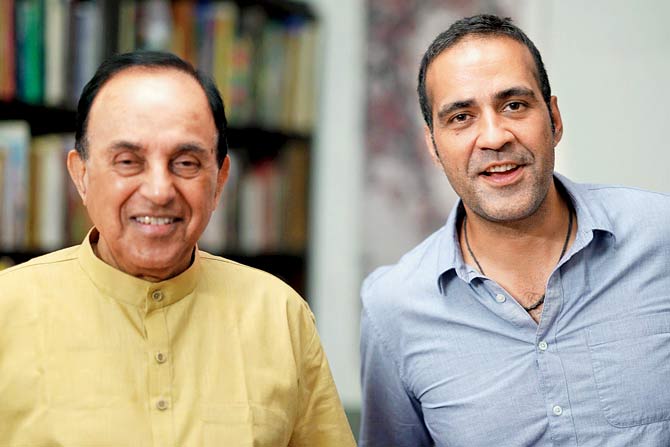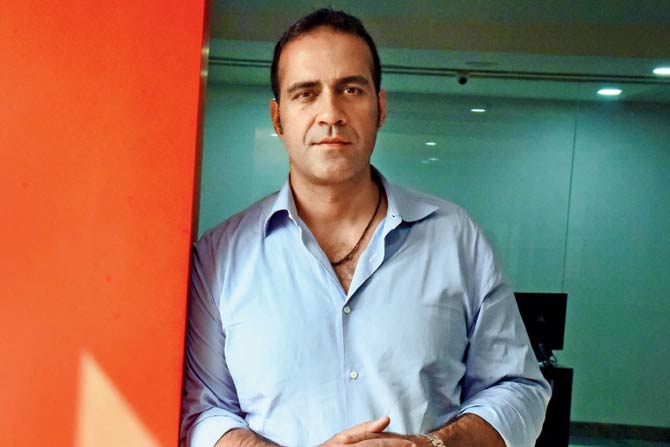A new documentary for Al Jazeera by filmmaker Bruno Rosso, presented by exiled author-columnist Aatish Taseer, attempts to understand India's divisive, religious history that led to the rise of the Modi government.

A still from the film, In Search of India's Soul, taken on Independence Day last year
November seems like a very long time ago. The student protest at Jawaharlal Nehru University (JNU), against the hike in hostel fees, had not yet taken root. Neither had the nationwide demonstrations—some more violent than others—following the Citizenship (Amendment) Act, which then, was only a bill. The police were still friends. And the lathi, though brutal, was used with restraint and reason.
That month as undisturbed as it seemed, saw author-columnist Aatish Taseer being severed from his roots, when the Government of India revoked his Overseas Citizen of India (OCI) card. The Ministry of Home Affairs (MEA) had said that Taseer had, in his Person of Indian Origin application, concealed that his late, estranged father was of Pakistani origin. It's a claim that the journalist contested later, in his second piece for Time magazine, six months after his controversial cover story, where he criticised Prime Minister Narendra Modi, as "India's divider in chief".
Taseer brings this up again at the start of his new two-part documentary for Al Jazeera, In Search of India's Soul. "It's a country I love, and will always call home.
But...political leaders attacked me as a foreigner, wrongly calling me a Muslim and Pakistani. I am neither."
While home continues to elude Taseer, the documentary that he worked on with Naples-based filmmaker Bruno Rosso, much before his status came to be questioned, attempts to understand the deeper, historical factors, of which, he says, "the present politics is a manifestation". "The film has been 18 months in the making, but we began filming it in August [2019]. That was three months after the Time magazine article. But, I arrived in New Delhi quite easily. We were all around the north—UP, Delhi and Haryana. And then, I took a break to go and see my husband [Ryan Davis] in Greece. On the last day of my holiday, I received a letter from the home ministry [about revoking the OCI]," says Taseer in a telephonic interview from New York. "My lawyers in Delhi were alarmed by the tone of the letter, and they felt that it might be dodgy for me to return, specifically if I was to return to do a film like this. And so, it was literally in the last 12 hours before I was meant to fly to Delhi, that I decided to go to America."

Taseer interviews Subramanian Swamy for the film
Meanwhile, Rosso and his team went ahead and finished filming for the docu that aired this week on Al Jazeera. While the first part of the film offers a sweeping view of the turbulence, taking you through the religious lynchings and the aftermath, as well as the people who make up the Right-wing brigade, including the cow vigilantes and sword-wielding love jihad warriors, the second part, says Taseer, gives both sides of this historical confrontation. "It really does try to dramatise that Hindu sense of hurt and pain," he says.
Having Rosso, a non-Indian, helped. "I wasn't going with a prejudiced idea about one side or the other," says the filmmaker, who uses a pseudonym. Rosso's interest in the project began accidentally, around four years ago, following an interview with an Indian professor, who was an expert on the Constitution. "He told me that he was very worried about the interview we had conducted, and that he could lose his job, because he would be seen as a secularist. That an academic working in a respected Indian university was concerned about being seen as secular in a country with a secular constitution [in place], came as a shock. That got me thinking that there was something seriously amiss in India," he shares. When he started work on the documentary, he realised that the professor's anxieties were not his alone. "Many professional Indians [we reached out to] were worried about being able to help with something like this, as they have to stay and work in India. We got a sense that freedom of speech and critical journalism is very much under threat. It's an endangered species in India."
Though Taseer has lived through many riots, including the Babri Masjid demolition, he says there has never been a moment like the one India is experiencing now, where the foundation of the republic is being contested. "Everyone knew Hindu-Muslim tensions existed, but there wasn't a challenge to what India was going to be. That was never in contention," he shares. The remaking of India as one with an ethno-religious Hindu future, he feels, will actually drain its energy and talent. "It's almost as if they [the government] were using the idea of Israel [Jewish state], as a kind of model of what India should be."
Taseer says his mother, veteran journalist Tavleen Singh, once an ardent supporter of Modi, has taken his "exile" very badly. Her new book, Messiah Modi: A Tale of Great Expectations (HarperCollins India) talks about how Modi and his government disappointed her. "We were both living with a difference of opinion. I did have expectations from this government, but within a few months of it coming to power, I was done with them, especially after the PM maintained an ominous silence following the lynching of [Mohammad] Akhlaq. After that, I have never been a supporter, either publicly or privately. But my mum carried on believing. And maybe she carried on, too long. It took this moment for the scales to fall from her eyes. I feel she is living with a sense of political alienation. She has always been Centre Right. And she is not at home with the Left, as they don't want anything to do with her."

However, the silver lining, Taseer says, is everything that has happened in the country, in the last two months, which he regrets not being able to integrate into his documentary because of his absence. "I would have loved to be there [In India], just to observe. But I think, the film is still very strong without even covering this moment," he says. "We are going to have a very long five years, because normally this happens to governments in their third or fourth year, and then you have an election and the release comes. This government is in their year zero, so you have five years and a majority. But I feel India is awake. The AAP victory is a small symptom. I am more hopeful now."
Catch up on all the latest Mumbai news, crime news, current affairs, and also a complete guide on Mumbai from food to things to do and events across the city here. Also download the new mid-day Android and iOS apps to get latest updates
 Subscribe today by clicking the link and stay updated with the latest news!" Click here!
Subscribe today by clicking the link and stay updated with the latest news!" Click here!









